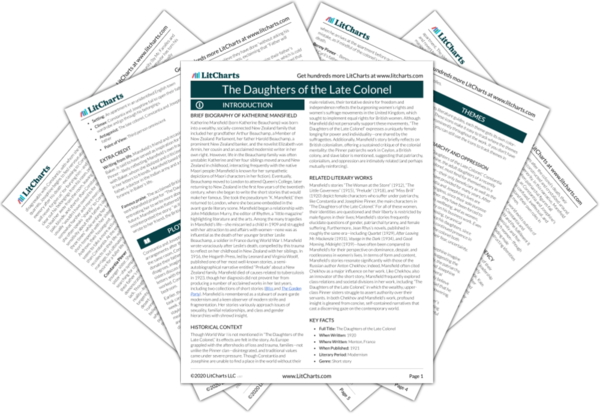Flashbacks in the narrative suggest that Constantia and Josephine’s relationship to their brother, nephew, and deceased mother are as complicated as their relationship to the colonel: Mansfield depicts a fractured family, torn apart by death, money, and conflicting desires. Written in the recent wake of the Victorian era, “The Daughters of the Late Colonel” explores family structures that no longer adhere to the traditional model of stable Victorian living. Instead, the Pinners are dysfunctional, detached, and fragmented—qualities Mansfield mimics in the structure of the story, which features abrupt shifts in time and space. The Pinners’ own lack of stability also mirrors the overall instability of the burgeoning modernist era, a period characterized by war, economic disruption, and severe sociocultural shifts.
Though Constantia and Josephine are clearly grief-stricken by their father’s death (Josephine insists that she “couldn’t have put” on her grief while writing replies to condolence letters), they are also reminded of his tyranny, cruelty, and weakness as a father. In this post-Victorian family, paternalistic love is neither a given nor a stabilizing force. Constantia, Josephine, and Cyril, their nephew, receive no support or kindness from the colonel during his lifetime, who treats all of them with disdain—especially Cyril, whom he harangues in a flashback to a scene before his death. It is strongly implied that Cyril finds his family disruptive and overly complicated, since he attempts to leave his aunts and grandfather early, prioritizing business over family ties: “I say, Auntie Con, isn’t your clock a bit slow? I’ve got to meet a man at—at Paddington just after five. I’m afraid I shan’t be able to stay very long with grandfather.”
Neither does Cyril have a positive relationship with his own father, Benny. When Constantia asks him if his father enjoys meringues, Cyril is unable to answer. “Don’t know a thing like that about your own father, Cyril?” asks Josephine, and Cyril is forced to pretend that he knows his father’s preferences—though Benny works overseas and is clearly absent from his son’s life. Furthermore, neither Benny nor Cyril attend the colonel’s funeral, emphasizing that their connections to fatherhood are tenuous at best.
With no stable matriarchal figures—for Constantia and Josephine are hardly forceful—and no nurturing patriarchs, the Pinner family is devoid of leadership and characterized by stiff, uncomfortable relationships. Benny’s wife, Hilda, “the unknown sister-in-law,” is remembered as “not in the least interested,” and Benny is barely mentioned in the narrative. Like Cyril, he is ostensibly more concerned with his work in the colonies than with his immediate family, and it is suggested that Constantia and Josephine are the only relatives who have maintained a close connection—since they live together in the same apartment. Whereas Benny, Cyril, and the colonel have pursued profit and business, Constantia and Josephine have pursued nothing: they have little in common with their other relatives, and their family is neither supportive nor loving. The Pinners are as unstable as they are separated, defying the model of the Victorian-era family as a structured unit focused on child-rearing and domestic unity.
The story’s private family tensions reflect sociopolitical ones; “The Daughters of the Late Colonel” is a wholly modernist story whose unconventional structure and techniques reflect the changing sociopolitical landscape of the modernist era. As tradition and hierarchy became subject to revision and revolution—provoked by war and other extreme disruptions to the social fabric of Europe—modernist writers sought to address the deterioration of commonly held social values in their work. By moving fluidly between past and present, interior memory and dialogue, and different focalizing presences, Mansfield creates a narrative as disjointed as the family at its heart. The Pinners might function as a microcosm of the broader social fragmentation seen in this era. Mansfield’s story itself performs this fragmentation, emphasizing the sense of instability and turmoil central to modernist writing.
Though tradition is ever-present in “The Daughters of the Late Colonel”—traditions of mourning, of female domesticity, and of male dominance—the family depicted in this narrative is far from traditional, reflecting the shifting social landscape of early twentieth-century Europe. Mansfield’s own modernist style simultaneously highlights the Pinners’ unconventionality and fractured qualities, speaks to literary modernist aesthetics, and demonstrates the overall atmosphere of chaos and abrupt social transformations she witnessed as a modernist writer.
Family, Instability, and Fragmentation ThemeTracker

Family, Instability, and Fragmentation Quotes in The Daughters of the Late Colonel
Supposing father had wanted to say something—something private to them. Not that he had. Oh, far from it! He lay there, purple, a dark, angry purple in the face, and never even looked at them when they came in. Then, as they were standing there, wondering what to do, he had suddenly opened one eye. Oh, what a difference it would have made, what a difference to their memory of him, how much easier to tell people about it, if he had only opened both! But no—one eye only. It glared at them a moment and then… went out.
“But—but it seems so weak,” said Josephine, breaking down.
“But why not be weak for once, Jug?” argued Constantia, whispering quite fiercely. “If it is weak.” And her pale stare flew from the locked writing-table—so safe—to the huge glittering wardrobe, and she began to breathe in a queer, panting way.
“Why shouldn’t we be weak for once in our lives, Jug? It’s quite excusable. Let’s be weak—be weak, Jug. It’s much nicer to be weak than to be strong.”
“Is your dear father still so fond of meringues?” asked Auntie Con gently. She winced faintly as she broke through the shell of hers.
“Well, I don’t quite know, Auntie Con,” said Cyril breezily.
At that they both looked up.
“Don’t know?” almost snapped Josephine. “Don’t know a thing like that about your own father, Cyril?”
“Surely,” said Auntie Con softly.
Cyril tried to laugh it off. “Oh, well,” he said, “it’s such a long time since—” He faltered. He stopped. Their faces were too much for him.











